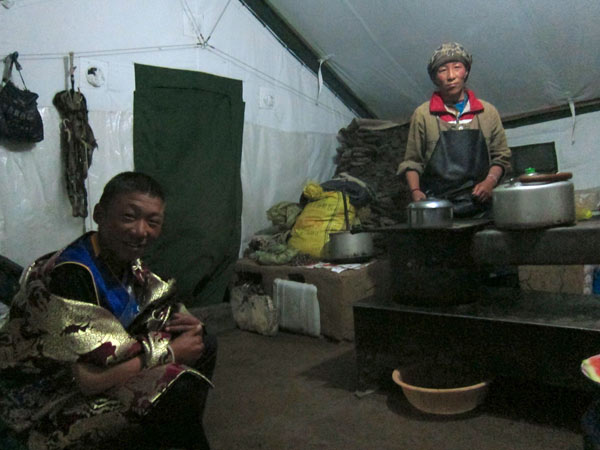No-man's land is nomads' land
By Erik Nilsson in Qumalai, Qinghai ( China Daily ) Updated: 2015-07-18 08:11:39
 |
|
The 13-year-old son, Chenlee Shira, wears a traditional robe over his Laker's jersey. |
You can't lock a tent.
Not all burglars are human. Bears regularly raid nomads' food stores.
A bear set a herder's house ablaze - a tale I found difficult to believe until the local government confirmed it had investigated and paid compensation. (He'd set his stove in the doorway to burn bears and scare them off. This particular marauder instead knocked it over.)
It's perhaps a reminder the most gorgeous geology and enchanting ecology often host some of the poorest people.
Ahzhub's family struggles to extract a living from postcard-perfect landscapes. They pulled in about 5,000 yuan ($800) a year beneath a snowcap.
I was spending my last night in Yege in their tent in Qumalai county's peripheries, after two weeks of terrific yet tough travels through the remote nomadic fringes of Qinghai province's Yushu Tibetan autonomous prefecture in 2013.
(I also traveled there in 2011 and 2014.)
Over the previous two weeks, I'd led a group of volunteers to install solar panels, computer labs, multimedia centers, a music room and a library in far-flung primary schools. We also bought food staples for the poorest families.
Our journeys were equal parts delightful and deprivation.
Volunteers had to be extracted because of the average 4,500-meter elevation. Altitude sickness had bedridden many. They suckled oxygen bags.
One 2012 volunteer realizes his father skydived - that is, leapt out of planes - from lower altitudes than he was driving over in Yege.
In 2013, there were breakdowns. A landslide. An earthquake.
And other - you could call them - "bumps" in the road.
A downtown cabbie pulled a knife on me the last night in Yushu over a fare disagreement, for instance.
But the amazing blotted out adversity.
It's no destination for tourists - but an astonishing place for explorers.
|
|
|
|
|
|
|
|

























 Raymond Zhou:
Raymond Zhou: Pauline D Loh:
Pauline D Loh: Hot Pot
Hot Pot Eco China
Eco China China Dream
China Dream China Face
China Face






